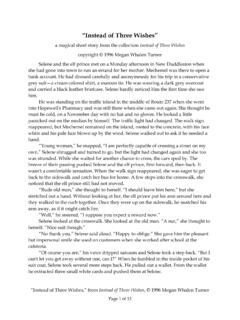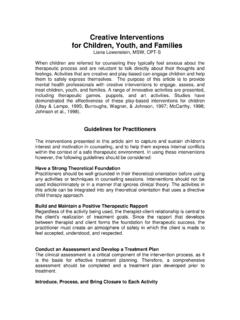Transcription of The Three Wishes by Douglas harding - Stillness Speaks
1 The Three Wishes by Douglas harding The Three Wishes You get what you want, because you want what you get Once upon a time there was a poor woodsman who lived with his wife in the forest. One day, when he was cutting logs by a stream, he was startled to hear someone crying, and even more startled to find it was a fairy sitting on the bank of the stream bemoaning the fact that he couldn't get across. Lifting him onto his shoulder, the woodsman waded the stream and set the little fellow down gently on the other bank. 'As a reward for your kindness,' said the fairy, 'I grant you Three Wishes .' That evening, over their humble meal, the woodsman told his wife about the fairy and the Three Wishes , and they discussed at length what boons to ask for.
2 'While we're making up our minds,' said the woodsman, 'I certainly could do with a sausage to go with this dry bread.' And immediately a fine sausage landed on the table. His wife, furious at him for wasting a wish on something so trivial instead of a sack of gold, couldn't help blurting out, 'You stupid old man! You deserve to have this miserable sausage growing at the end of your miserable nose!' And at once there it was, dangling from the poor man's nose. Well, after further argument and mutual recrimination, they agreed that their third and last wish must be to get rid of the sausage and restore the situation to normal. And so it happened. The Three Wishes were indeed granted as the good fairy had promised, yet in the end they left everything unchanged.
3 The man and his wife got what they finally decided on, which left the normal routine of their simple lives unchanged. But with this difference: it was their choice. What a waste opportunity! Or was it? Was all lost by that foolish couple? Or could there have been more to that third wish than just repairing a desperate situation? Was it, after all, and in spite of their silliness, the wisest and most rewarding wish they could have made, the true sack of gold? The one we all need to make, as well the one we are all granted? Various lessons can be learned from this well-known folktale. The one offered here is as follows. We are indeed granted Three Wishes . The first and overt one is that we get something we consciously want. The second and hidden wish is that, along with that something, we get the shadow side of it without which it's a mere phantom it's negative side or antithesis which we don't consciously want.
4 Far from it! The third and even more hidden wish is that we get all of the things both 'good' and 'bad' everything that happens to us, much of which our surface mind vaguely resents and some of which it hates and fears. Evidently this third and last wish is the only one that is always granted in full. And not at all, evidently, is it whether or not we ever get round to admitting it the one that is our deepest desire. The truth is that we have already chosen that our world shall be exactly as it is at this moment, but are unaware of having made this momentous choice. We repress it, and the symptoms of repression afflict us. We disclaim responsibility and wash our hands of the whole tragi-comic affair and pay the heavy price.
5 And so it comes about that our true life's work and our healing is to end that repression, raising to consciousness our heartfelt acceptance of the world just as it impinges on us. That, in brief, is our interpretation of the story of the woodsman's Three Wishes . The masters of the spiritual life are in agreement. 'God is telling you,' says Jean-Pierre de Caussade, 'that if you abandon all restraint, carry your Wishes to their furthest limits, open your heart boundlessly, there is not a single moment when you will not find all you could possibly desire. The present moment holds infinite riches beyond your wildest dreams.' On the face of it, this is extravagant talk, wish-fulfilling nonsense that's far too good to be true. Such wild optimism, apparently so contrary to common sense and to our experience of life itself, certainly isn't to be taken blindly on trust.
6 It demands rigorous testing and proof, if it's to be credited at all. And most of us, floundering if not yet drowning in a raging sea of disappointments and frustrations, are going to take a lot of convincing. In the rest of this chapter, I want to put to you some reasons for concluding that, amazingly, de Caussade was altogether right to claim that, when we let ourselves go (repeat, when we let ourselves go) and push our Wishes beyond our surface consciousness to their as-yet-unconscious limit, we shall find them at once perfectly fulfilled. That, in fact, the reason that we don't get what we want is that we don't want enough; that our demands, like those of the woodsman and his wife, are infinitely too modest. Only get your Identity right, and the rest comes right.
7 Whatever your problem, the only real answer to it is to see whose problem it is. The answer to the problem of your will of what you want and how to get it is no exception. Who is the one that demands this and refuses that? Who is this one really and truly? Solve that riddle and you have solved the riddle of what you really wish for, and how to be really sure of getting it. Put it like this: you have two identities, one apparent and provisional and the other real and for good. In appearance, as you are seen by other people (looking at you from a distance) you certainly are a something something shaped, confined within distinct boundaries, perfectly opaque, multicolored, local and not all over the place, hugely complex, moving around, going for this and avoiding that, and moreover just one of countless similarly limited and very choosy creatures.
8 But in reality, as you see yourself (looking at yourself from no distance) you Well, why not just look and see, right now? Isn't it a fact an amazing and crucial fact that in your own present experience you are the very opposite of how you strike others, and of how you struck yourself before you got around to looking for yourself? That instead of being a thing among things you are Space for things including, just now, these printed words, this page, the hands holding the book, and their fuzzy background? Only you are in a position to answer the all-important question of what's your side of the scene, of whatever's occurring to you. If, in all honesty, you perceive yourself to be a something here confronting a lot of somethings there, why of course you should stick to your view: you are the sole authority on your experience of you.
9 Only, in that case, I suggest you take a short break from reading, and devote it to re-examining the spot you occupy, just in case you discover that, after all, it's occcupied by others and not by you at all! But if you do indeed find that you are No-thing where you are, if you agree that you are Space, Accommodation for whatever you happen to be occupied with, why then the problem of your will of getting your own way is solved. In reality you have no will, seeing that Space has no needs and makes no demands. As Space you are self-sufficient, whereas none of the bodies, of the visible bits and pieces of your own body, none of the limited objects coming and going in your Space is self-sufficient. Their needs are insatiable; they must continually pursue what makes for their survival and resist what makes for their destruction.
10 All this purposive behavior of course characterizes you also as the limited object you appear to be when looked at from outside, but never you as the unlimited Subject you really are when looked at from inside. As Capacity for objects you the Subject are freed from them all, forever the same, unstainable, invulnerable. Obviously this self-aware Emptiness which you now clearly perceive yourself to be doesn't prefer some of its contents to others. It has no favorites, no preferences, no opinions, no plots or plans, no comments at all to make. Like a mirror it accepts dirty things as readily as clean ones, ugly things as uncritically as beautiful ones, tragic things as coolly as joyfull ones, and none of them leaves any trace. As your true Self you have no likes or dislikes, which in practice is only another way of saying that in the last resort all happens to your liking.










